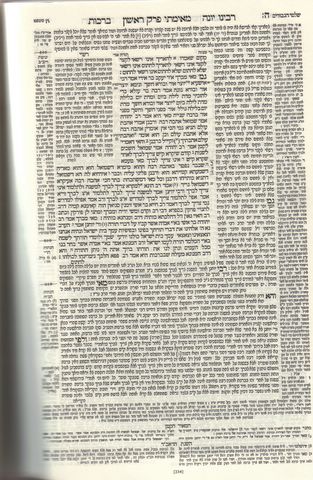 {Brachot 11a}
{Brachot 11a}Gemara:
The Sages learnt: Bet Hillel says: You may stand and read; sit and read; lay down and read; being involved in their work and read;
and these words {of Bet Hillel about doing work} are as regards the second perek {of Shema}, but in terms of the first perek he may not read and involve himself in his work, like they wanted to say before.
Rami bar Yechezkel {we have just Rabbi Yechezkel} learnt: One who does like Bet Shammai has done {well}, and one who does like Bet Hillel has done.
And Rav Yosef said: One who does like Bet Shammai has not accomplished anything.
Rav Nachman bar Yitzchak said: One who does like Bet Shammai is liable the death penalty, as we learn in the Mishna:
R. TARFON SAID: I WAS ONCE WALKING BY THE WAY AND I RECLINED TO RECITE THE SHEMA' IN THE MANNER PRESCRIBED BY BETH SHAMMAI, AND I INCURRED DANGER FROM ROBBERS. THEY SAID TO HIM: YOU DESERVED TO COME TO HARM, BECAUSE YOU ACTED AGAINST THE OPINION OF BETH HILLEL.MISHNA:
IN THE MORNING TWO BLESSINGS ARE TO BE SAID BEFORE IT AND ONE AFTER IT. IN THE EVENING TWO ARE SAID BEFORE IT AND TWO AFTER IT, ONE LONG AND ONE SHORT

WHERE THEY [THE SAGES] LAID DOWN THAT A LONG ONE SHOULD BE SAID, IT IS NOT PERMITTED TO SAY A SHORT ONE.
WHERE THEY ORDAINED A SHORT ONE A LONG ONE IS NOT PERMITTED.
[A PRAYER] WHICH THEY ORDERED TO BE CONCLUDED [WITH A BENEDICTION]
MUST NOT BE LEFT WITHOUT SUCH A CONCLUSION;
ONE WHICH THEY ORDERED TO BE LEFT WITHOUT SUCH A CONCLUSION MUST NOT BE SO CONCLUDED.
Gemara:
What does he bless?
Rav Yaakov bar Iddi cited Rabbi Oshaya: Yeshaya 45:7: ...יוֹצֵר אוֹר וּבוֹרֵא חֹשֶׁךְ
{
}WHERE THEY ORDAINED A SHORT ONE A LONG ONE IS NOT PERMITTED.
[A PRAYER] WHICH THEY ORDERED TO BE CONCLUDED [WITH A BENEDICTION]
MUST NOT BE LEFT WITHOUT SUCH A CONCLUSION;
ONE WHICH THEY ORDERED TO BE LEFT WITHOUT SUCH A CONCLUSION MUST NOT BE SO CONCLUDED.
Gemara:
What does he bless?
Rav Yaakov bar Iddi cited Rabbi Oshaya: Yeshaya 45:7: ...יוֹצֵר אוֹר וּבוֹרֵא חֹשֶׁךְ
{
And let him say: יוֹצֵר אוֹר וּבוֹרֵא נוגה - who forms the light and creates brightness.Rabba bar Ulla said: in order to mention the feature of the night during the day, and in order to mention the feature of the day during the night.
The feature of the night during the day - יוֹצֵר אוֹר וּבוֹרֵא חֹשֶׁךְ
The feature of the day during the night - גולל אור מפני חשך וחשך משני אור - "who rolls away light from before darkness, and darkness from before light."
The second blessing, what?Rav Yehuda cited Shmuel: Ahava Rabba {=with great love}
And the Sages say: Ahavat Olam {=with eternal love}
A brayta also says so: We do not say ahava rabba but rather ahavat olam.
and so too it says in Yirmiyahu 31:2:
and we establish (halacha) like the Sages.
And this that we say later on:
Rav Yehuda cited Shmuel: One who arises early to learn before reading kriyat Shema needs to bless {the blessings said before learning Torah}. After he reads kriyat Shema needs not bless. What is the reason? Because he has already been freed of his obligation with {saying} Ahava Rabba {and it does not say with Ahavat Olam}is a statement of Shmuel which is in accordance with the earlier statement, and the Sages argue on him, and Shmuel's opinion has already been rejected, for we learn in a brayta like the Sages, and all that we see afterwards using the terminology Ahava Rabba is going after Shmuel.
{We have a different girsa of the following machloket in our gemara}
Rav Huna said: For Scripture one must make a blessing. For Mishna and Talmud one need not bless.
Rabbi Yochanan said: For Mishna one must make a blessing; For Talmud one need not bless.
R Eleazer said: Even for Talmud one must make a blessing.
Rav said: Even for Midrash one must make a blessing.
for Rav Chiyya bar Ashi said: many times I stood before Rav to learn the perek in Sifra of the school of Rav, and he first washed his hands and blessed and taught us the perek.And Rav Hai Gaon z"l wrote that the halacha is in accordance with Rav, and the practice is like
him.
What does he bless?
Rav Yehuda bar Ashi said: Baruch Ata Hashem Elokeinu Melech HaOlam Asher Kideshanu BeMitzvotav Vetzivanu al Divrei Torah. {...Who has sanctified us with his commandments and commanded us upon words of Torah.}
And Rabbi Yochanan said: Haarev Na Hashem Elokeinu Et Divrei Toratecha BeFinu UveFifiyot Amcha Bet Yisrael VeNihyeh Anachnu VeTzetzaeinu VeTzetzaei Amcha Bet Yisrael Kulanu Yodei Shemecha VeLomdei Toratecha Lishma. Baruch Ata Hashem HaMelamed Torah LeAmo Yisrael. {Please sweeted, Oh Hashem our God, the words of your Torah, in our mouths and in the mouths of your nation the house of Israel, and may we and our offspring and and offspring of your nation the house of Israel - all of us - know your Name and study Torah for its own sake. Blessed are you Hashem, who teaches Torah to his nation Israel.
And Rav Hamnuna said: Baruch Ata Hashem Elokeinu Melech HaOlam Asher Bachar Banu MiKol HaAmim veNatan Lanu et Torato. Baruch Ata Hashem Noten HaTorah. {Blessed are you Hashem, our God, King of the World, who has chosen us from all the nations and gave us his Torah. Blessed are you Hashem, Giver of the Torah.}
And this is Rav Hamnuna is the loftiest of the blessings.
Rav Pappa said: Therefore we say all of them.
{In our gemara, we have Rav Hamnuna saying this is the loftiest of the blessings, no mention is made of Rav Pappa, but it continues: Therefore we say all of them.}
No comments:
Post a Comment